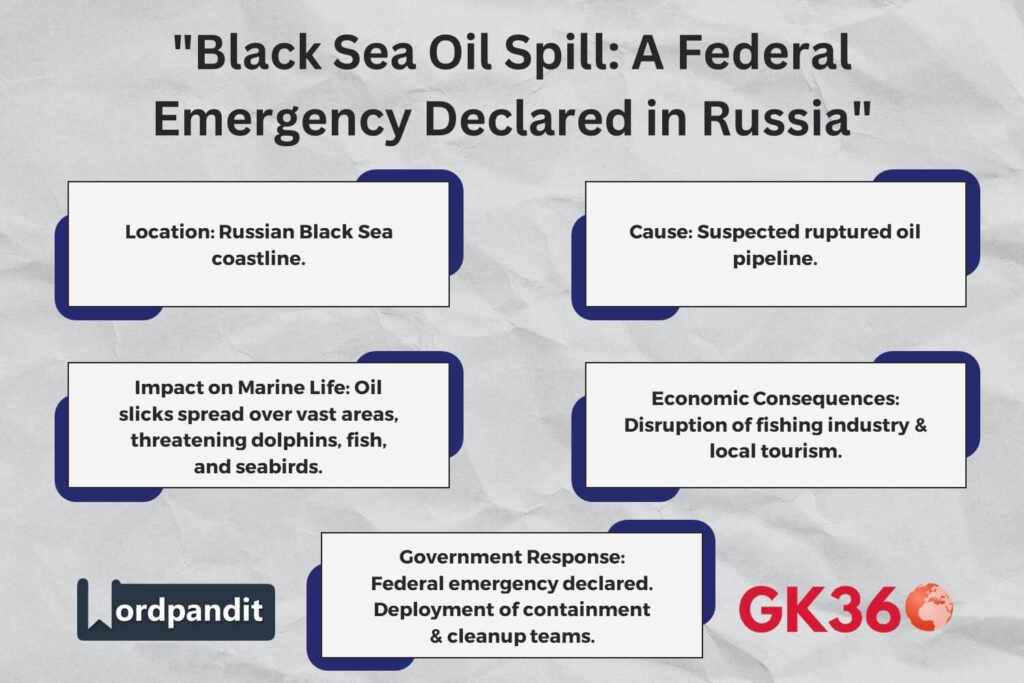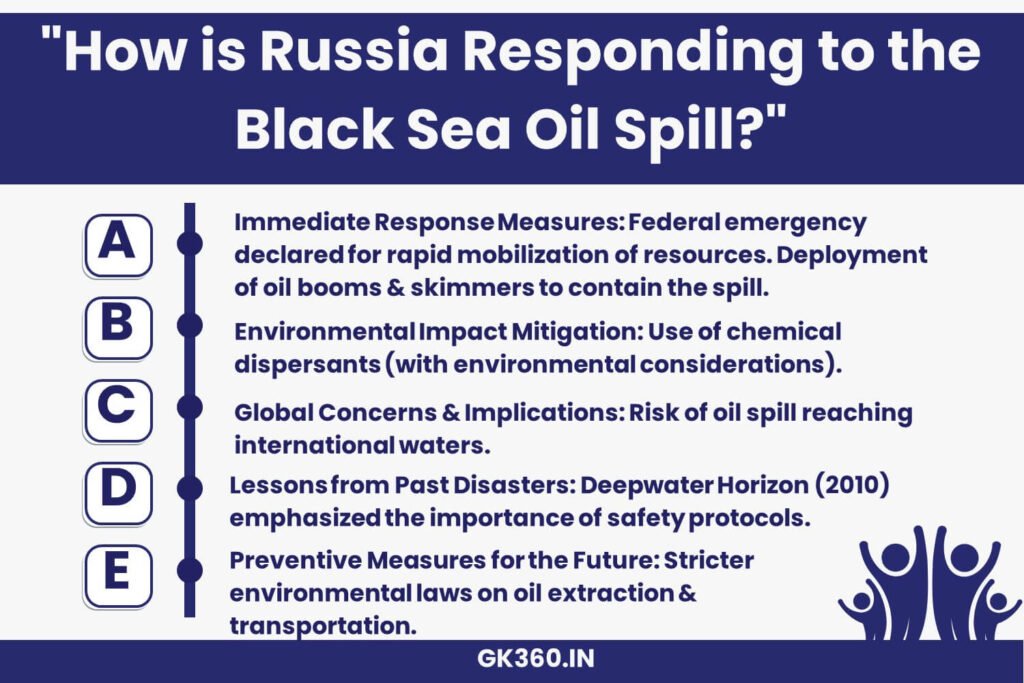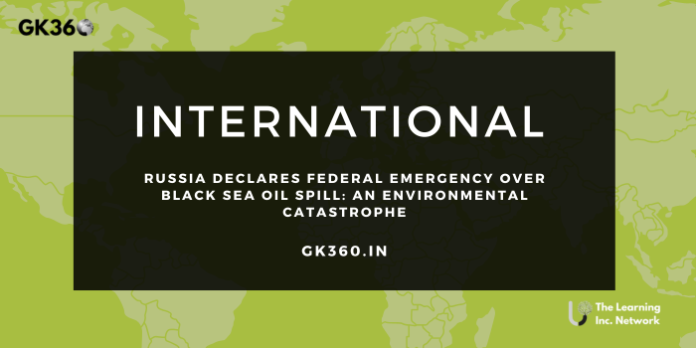The Black Sea Oil Spill Triggers Federal Emergency in Russia
Introduction
The recent oil spill in the Black Sea has prompted Russia to declare a federal emergency, underscoring the severity of this environmental crisis. This alarming incident has not only raised concerns over marine and ecological damage but also reignited global discussions on oil spill management, environmental policies, and sustainable energy practices.

Table of Contents
- The Black Sea Oil Spill: What Happened?
- The Federal Emergency Declaration
- Environmental and Economic Impact
- Global Implications of the Spill
- Lessons from Previous Oil Spills
- Response and Cleanup Efforts
- Preventing Future Disasters
- FAQs About the Black Sea Oil Spill
- Conclusion
1. The Black Sea Oil Spill: What Happened?
A significant oil spill was reported near Russia’s Black Sea coastline, causing widespread contamination of surrounding waters.
- The spill is believed to have originated from a ruptured pipeline.
- Thousands of barrels of oil have leaked into the sea, threatening marine biodiversity and local communities reliant on fishing and tourism.
2. The Federal Emergency Declaration
In response, the Russian government declared a federal emergency to:
- Mobilize resources for containment efforts.
- Allocate national funds for cleanup operations.
- Deploy emergency personnel and environmental experts.
- Task the Ministry of Natural Resources and Environment with leading the response.
3. Environmental and Economic Impact
Environmental Damage
- Oil slicks have spread over a vast area, endangering marine species such as dolphins, fish, and seabirds.
- Contamination of coastal nesting and breeding habitats could cause long-term ecological imbalance.
Economic Consequences
- The spill has disrupted fishing activities, a key livelihood for coastal communities.
- Tourism is expected to suffer due to oil-stained beaches, deterring visitors.
- Cleanup costs and legal penalties for responsible parties could run into millions of dollars.
4. Global Implications of the Spill
The Black Sea oil spill highlights the risks of fossil fuel extraction and transportation, emphasizing:
- The need for stringent safety protocols.
- The importance of shifting towards renewable energy sources.
- The necessity of international cooperation in addressing environmental disasters with transboundary effects.
5. Lessons from Previous Oil Spills
Past incidents offer crucial insights into managing oil spills:
- The 2010 Deepwater Horizon spill in the Gulf of Mexico showed the consequences of inadequate safety measures.
- Rapid response, technological innovation, and international collaboration were key in mitigating damage.
- Russia’s handling of the Black Sea spill will be scrutinized for adherence to global best practices.
6. Response and Cleanup Efforts
Emergency teams have implemented containment and cleanup measures, including:
- Deploying booms and skimmers to contain and collect oil.
- Using chemical dispersants to break down the oil (though their environmental impact is debated).
- Seeking assistance from international organizations specializing in oil spill management.
7. Preventing Future Disasters
Key strategies to avoid similar incidents include:
- Strengthening Regulatory Frameworks: Enforcing stricter regulations on oil extraction, transportation, and storage.
- Investing in Technology: Advanced monitoring and spill detection systems can help identify and address leaks early.
- Promoting Renewable Energy: Reducing dependence on fossil fuels is critical in mitigating environmental risks.
- Enhancing International Collaboration: Cross-border cooperation is vital for disaster response and environmental protection.

8. FAQs About the Black Sea Oil Spill
- What caused the Black Sea oil spill?The spill is believed to have been caused by a ruptured pipeline near Russia’s Black Sea coastline.
- How much oil has been spilled?Early estimates indicate thousands of barrels of oil have leaked into the sea.
- How is Russia responding to the crisis?The Russian government has declared a federal emergency, mobilizing resources, funds, and environmental experts for containment and cleanup.
- What is the impact on marine life?The spill threatens dolphins, fish, seabirds, and coastal ecosystems, leading to long-term ecological damage.
- What lessons can be learned from past oil spills?Previous incidents, such as the Deepwater Horizon spill (2010), highlight the importance of rapid response, safety protocols, and international cooperation.
9. Conclusion
The Black Sea oil spill serves as a wake-up call for nations worldwide to prioritize environmental sustainability. As Russia grapples with this crisis, the global community must extend support and draw lessons to prevent future incidents.
- Renewable energy adoption, stricter regulations, and international collaboration are key to ensuring a cleaner, safer planet.
- Russia’s response will be closely monitored to evaluate its effectiveness in mitigating the disaster’s impact.
- As environmental concerns grow, policymakers and industry leaders must commit to sustainable practices to reduce the likelihood of similar catastrophes.
Key Takeaways
| Aspect | Details |
|---|---|
| Location | Black Sea coastline, Russia |
| Cause of Spill | Suspected ruptured oil pipeline |
| Oil Spill Area | Spreading over vast marine zones |
| Impact on Environment | Threat to marine biodiversity, oil contamination of beaches |
| Economic Damage | Fishing & tourism industries severely affected |
| Government Action | Federal emergency declared, deployment of cleanup teams |
| Global Concerns | Risk of international waters contamination |
| Prevention Strategies | Stronger regulations, investment in renewables, better spill detection tech |
Related terms
- Black Sea Oil Spill 2024 Russia
- Russia Declares Federal Emergency for Oil Spill
- Environmental Impact of Black Sea Oil Spill
- Oil Spill Cleanup and Government Response
- Global Impact of Black Sea Oil Contamination
- Russia’s Environmental Policies After Oil Spill
- Lessons from Deepwater Horizon Oil Spill
- Marine Biodiversity at Risk from Oil Spill
- Renewable Energy as a Solution to Oil Spills
- Future of Oil Spill Prevention Technologies





